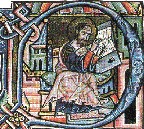CLICK TO REGISTER
MEDIEVAL STUDIES 310A: Topics in Medieval Studies:
Forgery and Authenticity in the Middle Ages and Renaissance (3 credits)

Term 2: T/Th 9:30am-11:00am
Prof. Courtney Booker, Department of History
Office: (604) 822-6480
cbooker@mail.ubc.ca
In the third and last edition (1586) of François Hotman‘s exhaustive polemic against the hereditary nature of the French monarchy, Francogallia, the author inserted what he claimed was “a remarkable piece of evidence that was sent to me from a certain ancient manuscript of undetermined authorship.” This evidence purports to be the actual ordination sermon delivered by Archbishop Boniface of Mainz to Pepin the Short in 751, which confirmed the replacement of the Merovingian royal dynasty with Pepin and his Carolingian heirs at the request of the Gallic people. Unfortunately, Hotman’s “certain ancient manuscript” has never been found. Indeed, one of his contemporaries even doubted its very existence; the humanist Claude Fauchet admitted that, while Hotman was certainly a man of quality and learning, he was well known for his ill affection toward the present monarchy. When considered in this light, together with certain peculiarities in its vocabulary and syntax, the ordination sermon of 751 in Fauchet’s estimation appeared utterly suspect. He stopped short of naming Hotman as its author.
When considering the early history of the Frankish monarchy, what are we to make of Hotman’s text? Is Fauchet’s argument valid? When did context and anachronism become guiding criteria for the authenticity of such texts? In this course, we will examine a pair of alleged forgeries with several such questions in mind, remaining attentive to the sliding definitions of authenticity and forgery, and the ideas of truth and falsehood that underpin them. Ultimately we will explore the ways in which the practice of forgery during the Middle Ages led to the advancement of critical skills in dealing with evidence from the past, and the impact this advancement would have upon historical consciousness.
We will begin by reading and discussing a wide range of secondary works on the topics of authorship; written and oral culture; paleography, codicology, and diplomatics; and lying and truth-telling. We will then turn to investigate as case studies the “Donation of Constantine” and the “Harangue to Pepin,” together with the remarks of their defenders and critics. In addition, we will read a number of broad essays throughout the term on the concepts of, and the complex relationships among, forgery, authenticity, culture, and value.